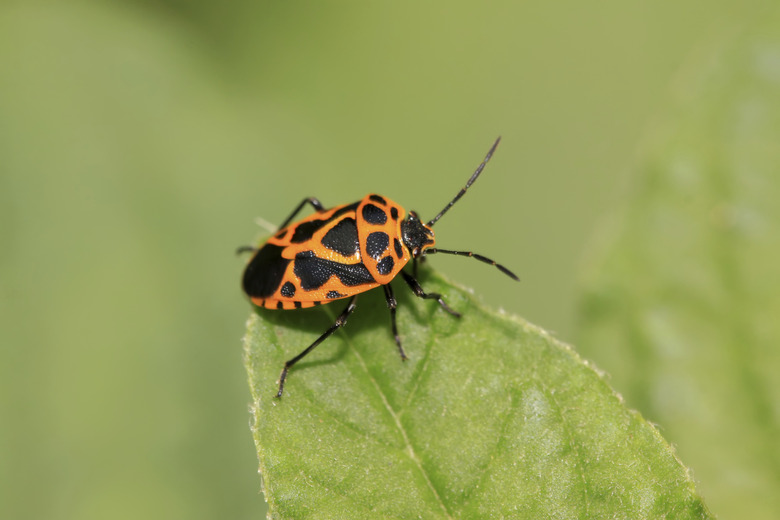What Insects Eat Stink Bugs?
Stink bugs only smell bad when disturbed. To identify them from afar, look for a pretty bug with a shield-shaped body. These bugs feed by inserting their mouth parts into your plants and sucking sap, a process that can damage or possibly kill a plant. Many predators eat stink bugs, including lacewings, beetles and spiders, but you'll need to take other measures to fight an infestation.
Predator Insects
Predator Insects
If you have stink bugs in your garden, several insects are ready, willing and able to step in to help. While no predator insect currently in the country limits its diet to stink bugs, many include stink bugs in their meals. Insects that eat stink bugs include green lacewings, damsel bugs, assassin bugs, bigeyed bugs, minute pirate bugs, soldier beetles and ground beetles. Predatory stink bugs and two egg parasitoids also kill stink bugs. Some types of spider also kill stink bugs.
Predator Insects Don't Do It All
Predator Insects Don't Do It All
A handful of stink bugs probably won't do serious damage to your garden. Only an infestation kills plants. General predator insects can help control stink bugs, but if you have a host of them, you'll need to take other measures to get rid of them. Start by removing all weeds in the area, where stink bugs congregate, acting early in spring before the populations get out of hand. You can also search your plants and pick off the distinctive bugs and their eggs. The eggs resemble tiny drums with lids and can be found in clusters on plants. Including small-flowered plants in your garden attracts general predator insects.
Parasitoid Trissolcus Wasps
Parasitoid Trissolcus Wasps
One wasp species from Asia offers hope for the future in your fight against stink bugs: parasitoid Trissolcus wasps. These wasps, native to China, Japan and Korea, are no bigger than gnats. They lay eggs inside the adult stink bugs and, when the eggs hatch, the immature wasps eat out the inside of the bugs. The wasps are currently being studied and their release has not yet been approved in the U.S. Because some stink bugs are beneficial insects, regulators don't want to unleash predators that will kill good insects as well as bad.
Problems With Pesticides
Problems With Pesticides
Contrary to the myth, killing a stink bug does not cause other stink bugs to rush to the area. Additionally, pesticides are not a smart choice for getting rid of stink bugs in the yard. One problem is that no pesticide is available that only kills stink bugs. Pesticides kill other, beneficial bugs as well, including the predator insects that might help get rid of the problem. In addition, pesticides do not kill stink bug eggs, so a new generation will appear. If your house is infested with stink bugs, killing them off with pesticides does nothing to prevent more stink bugs from entering.
References
- UC Statewide IPM Online: Stink Bugs
- UC Statewide IPM Online: General Predators
- Missouri Botanical Garden: Stink Bugs
- NPR: Can Wasps Squash the Stink Bug Plague?
- Rutgers Cooperative Extension: Brown Marmorated Stink Bug Information,Frequently Asked Questions
- National Pesticide Information Center: Stink Bugs
Cite This Article
MLA
Spengler, Teo. "What Insects Eat Stink Bugs?" sciencing.com, https://www.sciencing.com/what-insects-eat-stink-bugs-12516336/. 19 April 2011.
APA
Spengler, Teo. (2011, April 19). What Insects Eat Stink Bugs?. sciencing.com. Retrieved from https://www.sciencing.com/what-insects-eat-stink-bugs-12516336/
Chicago
Spengler, Teo. What Insects Eat Stink Bugs? last modified March 24, 2022. https://www.sciencing.com/what-insects-eat-stink-bugs-12516336/
